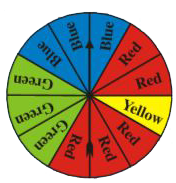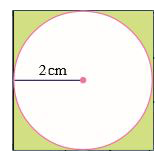Complete Solutions to EXERCISE 14.1 of chapter PROBABILITY of Class 9 book with complete answers and questions
| Class 9 | MATHS |
| Chapter | PROBABILITY |
| TELANGANA | EXERCISE 14.1 |
| Number Of Questions | 21 |
| Academic Year | 2023-24 |
A die has six faces numbered from 1 to 6. It is rolled and the number on the top face is noted. When this is treated as a random trial.
What are the possible outcomes ?
View SolutionA die has six faces numbered from 1 to 6. It is rolled and number on the top face is noted. When this is treated as a random trial. Are they equally likely? Why?
View SolutionA die has six faces numbered from 1 to 6. It is rolled and number on the top face is noted. When this is treated as a random trial. Find the probability of a composite number turning up on the top face.
View SolutionA coin is tossed 100 times and the following outcomes are recorded
Head:45 times Tails:55 times from the experiment
a) Compute the probability of each outcomes.
b) Find the sum of probabilities of all outcomes.
View SolutionA coin is tossed 100 times and the following outcomes are recorded
Head:45 times Tails:55 times from the experiment
a) Compute the probability of each outcomes.
b) Find the sum of probabilities of all outcomes.
View SolutionA spinner has four colours as shown in the figure. When we spin it once, find
a) At which colour, is the pointer more likely to stop?
b) At which colour, is the pointer less likely to stop?
c) At which colours, is the pointer equally likely to stop?
d) What is the chance the pointer will stop on white?
e) Is there any colour at which the pointer certainly stops?

View SolutionA bag contains five green marbles, three blue marbles, two red marbles, and two yellow marbles. One marble is drawn out randomly.
a) Are the four different colour outcomes equally likely? Explain.
b) Find the probability of drawing each colour marble
i.e. , P(green), P(blue), P(red) and P(yellow)
c) Find the sum of their probabilities.
View SolutionA bag contains five green marbles, three blue marbles, two red marbles, and two yellow marbles. One marble is drawn out randomly.
a) Are the four different colour outcomes equally likely? Explain.
b) Find the probability of drawing each colour marble
i.e. , P(green), P(blue), P(red) and P(yellow)
c) Find the sum of their probabilities.
View SolutionA bag contains five green marbles, three blue marbles, two red marbles, and two yellow marbles. One marble is drawn out randomly.
a) Are the four different colour outcomes equally likely? Explain.
b) Find the probability of drawing each colour marble
i.e. , P(green), P(blue), P(red) and P(yellow)
c) Find the sum of their probabilities.
View SolutionA letter is chosen from English alphabet. Find the probability of the letters being
a) A vowel b) a letter that comes after P
c) A vowel or a consonant d) Not a vowel
View SolutionEleven bags of wheat flour, each marked 5 kg, actually contained the following weights of flour (in kg) : 4.97, 5.05, 5.08, 5.03, 5.00, 5.06, 5.08, 4.98, 5.04, 5.07, 5.00 Find the probability that any of these bags chosen at random contains more than 5 kg of flour.
View SolutionAn insurance company selected 2000 drivers at random (i.e., without any preference of one driver over another) in a particular city to find a relationship between age and accidents. The data obtained is given in the following table:

Find the probabilities of the following events for a driver chosen at random from the city:
(i) The driver being in the age group 18-29 years and having exactly 3 accidents in one year.
(ii) The driver being in the age group of 30-50 years and having one or more accidents in a year.
(iii) Having no accidents in the year.
View SolutionWhat is the probability that a randomly thrown dart hits the square board in shaded region
(Take `π = (22)/(7)` and express in percentage)

View SolutionA die has six faces numbered from 1 to 6. It is rolled and the number on the top face is noted. When this is treated as a random trial.
a) What are the possible outcomes ?
b)Are they equally likely? Why?
c) Find the probability of a composite number turning up on the top face.
View SolutionA coin is tossed 100 times and the following outcomes are recorded
Head:45 times Tails:55 times from the experiment
a) Compute the probability of each outcomes.
b) Find the sum of probabilities of all outcomes.
View SolutionA spinner has four colours as shown in the figure. When we spin it once, find
a) At which colour, is the pointer more likely to stop?
b) At which colour, is the pointer less likely to stop?
c) At which colours, is the pointer equally likely to stop?
d) What is the chance the pointer will stop on white?
e) Is there any colour at which the pointer certainly stops?

View SolutionA bag contains five green marbles, three blue marbles, two red marbles, and two yellow marbles. One marble is drawn out randomly.
a) Are the four different colour outcomes equally likely? Explain.
b) Find the probability of drawing each colour marble
i.e. , P(green), P(blue), P(red) and P(yellow)
c) Find the sum of their probabilities.
View SolutionA letter is chosen from English alphabet. Find the probability of the letters being
a) A vowel b) a letter that comes after P
c) A vowel or a consonant d) Not a vowel
View SolutionEleven bags of wheat flour, each marked 5 kg, actually contained the following weights of flour (in kg) : 4.97, 5.05, 5.08, 5.03, 5.00, 5.06, 5.08, 4.98, 5.04, 5.07, 5.00 Find the probability that any of these bags chosen at random contains more than 5 kg of flour.
View SolutionAn insurance company selected 2000 drivers at random (i.e., without any preference of one driver over another) in a particular city to find a relationship between age and accidents. The data obtained is given in the following table:

Find the probabilities of the following events for a driver chosen at random from the city:
(i) The driver being in the age group 18-29 years and having exactly 3 accidents in one year.
(ii) The driver being in the age group of 30-50 years and having one or more accidents in a year.
(iii) Having no accidents in the year.
View SolutionWhat is the probability that a randomly thrown dart hits the square board in shaded region
(Take `π = (22)/(7)` and express in percentage)

View Solution
EXERCISE 14.1 questions and complete solutions for chapter PROBABILITY of NCERT Maths(Telugu) of Class 9